Death and burial of Sarah part-1
In chapter 23 we see the death of Sarah and Abraham’s purchase of a cave in which to bury her, the cave of Machpelah. The story of Genesis leaps forward several decades. It’s likely been around 20 years or so since Abraham prepared to offer Isaac on the altar.
It’s been about 35 years since last we saw Sarah, insisting that Hagar and Ishmael be sent away. Now Sarah has died at the age of 127 years old. That would make Abraham 137 years old and Isaac about 37 years old (Genesis 17:17).
We find them living in Hebron, near the familiar area of Mamre, about 20 miles south of what would become Jerusalem (Genesis 23:1–2). After Abraham mourns for his wife, he approaches the Hittite people of the area with a request.
These Hittites would be the descendants of Noah’s grandson Canaan, making them part of the original Canaanites. Abraham comes before an assembled group of Hittite landowners or elders, perhaps in the city gate of Hebron.
Abraham presents himself to them as a foreigner and a sojourner. He requests that they give him a piece of property to use as a burial place. Their response is gracious. They know Abraham well. They call him “a prince of God among [them].”
Abraham was a foreigner, but he was also quite wealthy and clearly blessed by God in all he did. The Hittites of the area seem to have regarded him as a friend (Genesis 23:3–6).
In fact, the Hittites offer Abraham the choice of any of their own tombs to bury his dead. Abraham, however, wants something more specific. He wants to establish a permanent family burial place of his own in the land of Canaan.
He wants to acquire a piece of property that will belong to him and him alone. Once the Hittites state that they are willing for Abraham to bury his dead in their region, Abraham reveals he has a specific property in mind.
He singles out Ephron, son of Zohar, and asks to purchase a cave of his east of Mamre at Machpelah. A negotiation of sorts takes place, couched in the tradition and customs of Middle Eastern bargaining.
Ephron offers to give the cave to Abraham, along with the field attached to it. Abraham insists on paying for it (so there can be no future dispute about who owns it).
Genesis 23:1-9 KJV
[1] And Sarah was an hundred and seven and twenty years old: these were the years of the life of Sarah.
[2] And Sarah died in Kirjath–arba; the same is Hebron in the land of Canaan: and Abraham came to mourn for Sarah, and to weep for her.
[3] And Abraham stood up from before his dead, and spake unto the sons of Heth, saying,
[4] I am a stranger and a sojourner with you: give me a possession of a buryingplace with you, that I may bury my dead out of my sight.
[5] And the children of Heth answered Abraham, saying unto him,
[6] Hear us, my lord: thou art a mighty prince among us: in the choice of our sepulchres bury thy dead; none of us shall withhold from thee his sepulchre, but that thou mayest bury thy dead.
[7] And Abraham stood up, and bowed himself to the people of the land, even to the children of Heth.
[8] And he communed with them, saying, If it be your mind that I should bury my dead out of my sight; hear me, and intreat for me to Ephron the son of Zohar,
[9] That he may give me the cave of Machpelah, which he hath, which is in the end of his field; for as much money as it is worth he shall give it me for a possession of a buryingplace amongst you.
Genesis 23:1 KJV
And Sarah was an hundred and seven and twenty years old: these were the years of the life of Sarah.
 Sarah is the only woman in Scripture whose age, death, and burial are mentioned, probably to do honor to the venerable mother of the Hebrew people. About 35 years have passed since the last mention of Abraham’s wife Sarah.
Sarah is the only woman in Scripture whose age, death, and burial are mentioned, probably to do honor to the venerable mother of the Hebrew people. About 35 years have passed since the last mention of Abraham’s wife Sarah.
At that prior incident, a celebration for the weaning of their son, Isaac, Sarah insisted that Ishmael, Isaac’s half-brother, should be sent away, along with his mother, Hagar (Genesis 21:10).
Sarah is not mentioned in the previous chapter’s description of Abraham’s near-offering of Isaac in obedience to God’s command. Sarah and Abraham waited a long time to finally have a child of their own.
Despite her own doubts, Sarah was finally given the child promised by God, when she was 90 years old (Genesis 17:17). Now Sarah has died at the age of 127, making Abraham around 137 years old and their son Isaac around 37.
Genesis 23:2 KJV
And Sarah died in Kirjath–arba; the same is Hebron in the land of Canaan: and Abraham came to mourn for Sarah, and to weep for her.
 He came from his own tent to take his station at the door of Sarah‘s. The “mourning” describes his conformity to the customary usage of sitting on the ground for a time; while the “weeping” indicates the natural outburst of his sorrow.
He came from his own tent to take his station at the door of Sarah‘s. The “mourning” describes his conformity to the customary usage of sitting on the ground for a time; while the “weeping” indicates the natural outburst of his sorrow.
Abraham’s wife Sarah dies in a place called Kiriath-arba, later known to the Israelites as Hebron. Previously, they had been living in Beersheba.
Hebron is located between Beersheba and Jerusalem, about 20 miles south of Jerusalem, close to Mamre. Abraham went in to the place where Sarah’s body was located, to mourn and to weep for her.
In addition to expressing his great sorrow, Abraham may also have followed the traditions for mourning the dead that would have included the tearing of garments, rubbing of ashes, and fasting.
The marriage of Abraham and Sarah, as recorded in Genesis, has revealed the strengths and weaknesses of both. As such, it rings true to marriage in any era. It’s not surprising to find Abraham mourning the loss of his wife so deeply.
Genesis 23:3 KJV
And Abraham stood up from before his dead, and spake unto the sons of Heth, saying,
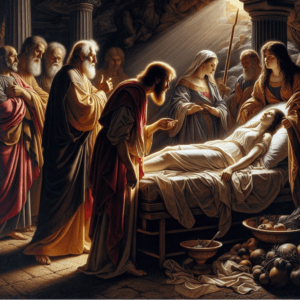 Eastern people are always provided with family burying-places; but Abraham‘s life of faith – his pilgrim state – had prevented him acquiring even so small a possession (Acts 7:5).
Eastern people are always provided with family burying-places; but Abraham‘s life of faith – his pilgrim state – had prevented him acquiring even so small a possession (Acts 7:5).
He bespoke their kind offices to aid him in obtaining possession of a cave that belonged to Ephron – a wealthy neighbor.
When the time of mourning for Sarah had ended, Abraham rose up and went out from the presence of her body. His next mission was to find a place to bury her.
As we’ll see in the following verses, it is important to Abraham to find a permanent burying place for his people in the land of Canaan. He will have to buy one and take clear ownership of it.
The area around their current dwelling place in Hebron was owned by a group known as the Hittites. Hittites means “sons of Heth.” Heth was one of the sons of Canaan, a grandson of Noah.
These Hittites, then, are clearly Canaanites of the land of Canaan, as opposed to other “Hittites” known from history.
This will become important, because Abraham will attempt to take full ownership of this burying place from the rightful owners of the land in the most public and indisputable manner possible.
Genesis 23:4 KJV
I am a stranger and a sojourner with you: give me a possession of a buryingplace with you, that I may bury my dead out of my sight.
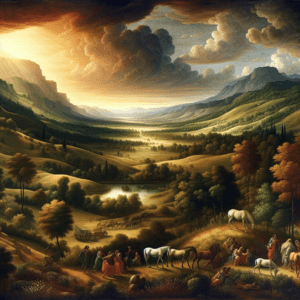 Abraham calls himself a stranger and a sojourner even in the Promised Land which God had promised to give to him. Abraham wants to secure the permanent ownership of a burying place in the land of Canaan.
Abraham calls himself a stranger and a sojourner even in the Promised Land which God had promised to give to him. Abraham wants to secure the permanent ownership of a burying place in the land of Canaan.
He approaches the Hittites, the rightful owners of the place he wishes to buy. He describes his situation clearly and simply. Abraham is a sojourner, a traveler, someone who is not a permanent resident in a place.
He is also a foreigner. This is not his country—yet. God has promised Him that it will be the possession of his offspring. Though he will pay for it, Abraham is asking to be given place to permanently bury his dead.
This is part of the eventual possession of the land by Israel; burying one’s dead in a specific place is a sign of ownership.
It is possible that Abraham stood before these Hittite men still dressed in his torn garments, with unkempt hair and covered in ashes, having just come from mourning his wife according to the custom of the day.
If so, the reason for his request would have been apparent, and the Hittites seem to receive it in a spirit of goodwill and openness, as described in the following verses.
Genesis 23:5 KJV
And the children of Heth answered Abraham, saying unto him,
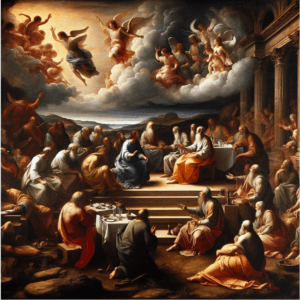 This is a very generous offer made by the children of Heth who live in this land. In the previous verse, Abraham made his request of the Hittite landowners to give to him a permanent burying place for his people in the land of Hebron.
This is a very generous offer made by the children of Heth who live in this land. In the previous verse, Abraham made his request of the Hittite landowners to give to him a permanent burying place for his people in the land of Hebron.
This is meant for his recently-deceased wife, Sarah (Genesis 23:2). This act of creating a long-term family tomb is part of Abraham’s family taking possession of the Promised Land. In the next verse, the Hittites will respond.
Genesis 23:6 KJV
Hear us, my lord: thou art a mighty prince among us: in the choice of our sepulchres bury thy dead; none of us shall withhold from thee his sepulchre, but that thou mayest bury thy dead.
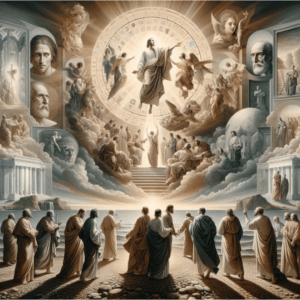 Abraham had made a tremendous impression. They call him “a mighty prince.” This man’s influence counted for something. Abraham had approached the Hittite landowners in Hebron with great humility, asking for property to use as a permanent burying place for his people.
Abraham had made a tremendous impression. They call him “a mighty prince.” This man’s influence counted for something. Abraham had approached the Hittite landowners in Hebron with great humility, asking for property to use as a permanent burying place for his people.
Most immediately, he needed a place to bury his wife Sarah, who had just died (Genesis 23:1). Their warm, kind response here echoes the nature of his request to them. Abraham had called himself a sojourner and foreigner.
They call him a prince of God or mighty price of God among them. In other words, they do not view Abraham as a mere wanderer; they see him as powerful, blessed by God, and worthy to be among them.
In fact, very generously, they insist that none of them would withhold from Abraham his own tomb for the purpose of burying his people, presumably starting with Sarah.
However, their response does not acknowledge Abraham’s request for a property of his own. He is not asking to share a tomb; he is asking to acquire a permanent possession, as the following verses will make clear.
Genesis 23:7 KJV
And Abraham stood up, and bowed himself to the people of the land, even to the children of Heth.
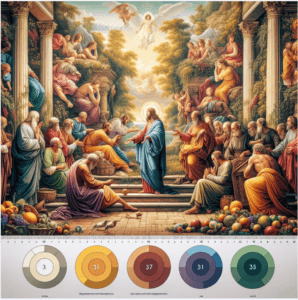 Abraham’s posture followed the customs of the time. In response to Abraham’s request for property in Hebron to use as a permanent burying place for his people, the Hittites had graciously acknowledged Abraham’s status among them and offered to share their own tombs with him.
Abraham’s posture followed the customs of the time. In response to Abraham’s request for property in Hebron to use as a permanent burying place for his people, the Hittites had graciously acknowledged Abraham’s status among them and offered to share their own tombs with him.
Abraham, however, intends to secure a permanent piece of property as his own. In response to their answer, Abraham stands and bows before the Hittites in a sign of great respect.
Throughout the negotiation that will follow, both Abraham and the Hittites will remain very respectful to each other. While politeness was an extremely important part of that culture, this exchange is particularly warm.
Abraham seems to be going out of his way to be cordial with the Hittites, and they clearly respect him enough to return that respect.
Genesis 23:8 KJV
And he communed with them, saying, If it be your mind that I should bury my dead out of my sight; hear me, and intreat for me to Ephron the son of Zohar,
 Abraham was not willing to bury Sarah in a borrowed tomb; he wanted to have a place that would belong to his family long after his death. Abraham now begins his response to the offer given by the Hittites.
Abraham was not willing to bury Sarah in a borrowed tomb; he wanted to have a place that would belong to his family long after his death. Abraham now begins his response to the offer given by the Hittites.
They had indicated none of them would withhold their own tomb from him as a place to bury his dead. This is a gesture of great respect, especially when extended to someone who is not part of their own tribe.
In the previous verse, Abraham stood to formally address the assembled group of Hittites. The assumption is that this group of landowners or elders is recognized as some kind of official governing body.
Abraham wishes for the negotiation that will follow to be recognized as binding and lasting. Now Abraham reveals that he has a very specific property in mind.
The group as a whole has granted their willingness for him to bury his dead in the area, though not yet in a property that he will own as a permanent possession.
In front of the group, he stands and singles out Ephron, the son of Zohar. In the following verse, Abraham will make his opening offer.
Genesis 23:9 KJV
That he may give me the cave of Machpelah, which he hath, which is in the end of his field; for as much money as it is worth he shall give it me for a possession of a buryingplace amongst you.
 The “double cave.” His words meet with Ephron indicated that he wanted to purchase some property, the cave of Machpelah. Abraham is formally addressing an assembled group of Hittite landowners or elders.
The “double cave.” His words meet with Ephron indicated that he wanted to purchase some property, the cave of Machpelah. Abraham is formally addressing an assembled group of Hittite landowners or elders.
He has expressed his desire to own a property in the area for the purpose of burying his dead. His wife Sarah has recently died (Genesis 23:2). The group has acknowledged Abraham’s prestigious status among them, even though he is a foreigner.
They have offered to share their tombs with him, expressing their willingness to have him bury his dead in the area. Abraham now stands and singles out the owner of a specific property.
He publicly addresses a man named Ephron who owns a cave at the end of a field. Abraham makes clear he wishes to buy this cave at Machpelah for its full value as a burying place for his people.
Part of the significance of this request is that Abraham is asking to become a landowner in the area, though he is a foreigner. This would make him an official stakeholder among the Hittites, though the size of his property would be very small.

Death and burial of Sarah part-2
In chapter 23 we see the death of Sarah and Abraham’s purchase of a cave in which to bury her, the cave of Machpelah. Ephron dismissively mentions a price of 400 shekels of silver for the cave and field.
Abraham immediately agrees, paying out the price on the spot and in full view of the assembled Hittites. Very quickly, the transaction is concluded and signed off by the Hittite elders (Genesis 23:7–18).
Finally, Abraham buries Sarah in the cave he now owns in the promised land of Canaan. Later, Abraham himself will be buried there, then Isaac and Rebekah and Jacob and Leah.
Without a battle of any kind, the people of God have begun their occupation of the land God has promised to give to Abraham’s offspring (Genesis 23:19–20).
Genesis 23:10-20 KJV
[10] And Ephron dwelt among the children of Heth: and Ephron the Hittite answered Abraham in the audience of the children of Heth, even of all that went in at the gate of his city, saying,
[11] Nay, my lord, hear me: the field give I thee, and the cave that is therein, I give it thee; in the presence of the sons of my people give I it thee: bury thy dead.
[12] And Abraham bowed down himself before the people of the land.
[13] And he spake unto Ephron in the audience of the people of the land, saying, But if thou wilt give it, I pray thee, hear me: I will give thee money for the field; take it of me, and I will bury my dead there.
[14] And Ephron answered Abraham, saying unto him,
[15] My lord, hearken unto me: the land is worth four hundred shekels of silver; what is that betwixt me and thee? bury therefore thy dead.
[16] And Abraham hearkened unto Ephron; and Abraham weighed to Ephron the silver, which he had named in the audience of the sons of Heth, four hundred shekels of silver, current money with the merchant.
[17] And the field of Ephron, which was in Machpelah, which was before Mamre, the field, and the cave which was therein, and all the trees that were in the field, that were in all the borders round about, were made sure
[18] Unto Abraham for a possession in the presence of the children of Heth, before all that went in at the gate of his city.
[19] And after this, Abraham buried Sarah his wife in the cave of the field of Machpelah before Mamre: the same is Hebron in the land of Canaan.
[20] And the field, and the cave that is therein, were made sure unto Abraham for a possession of a buryingplace by the sons of Heth.
Genesis 23:10 KJV
And Ephron dwelt among the children of Heth: and Ephron the Hittite answered Abraham in the audience of the children of Heth, even of all that went in at the gate of his city, saying,
 Literally, was “sitting” among the children of Heth in the gate of the city where all business was transacted. But, though a chief man among them, he was probably unknown to Abraham.
Literally, was “sitting” among the children of Heth in the gate of the city where all business was transacted. But, though a chief man among them, he was probably unknown to Abraham.
In the previous verse, Abraham publicly offered, before the elders of Hebron, to buy a cave from Ephron the Hittite as a burying place for his people. Those in the group had already made clear that they would welcome Abraham burying his people in the area.
In fact, they had offered to freely share their tombs with him. Abraham, however, wished to buy and own a tomb as a permanent possession.
Now Ephron prepares to respond to Abraham, also in a public manner, with the understanding that whatever agreement they reach will be formally recognized by the community.
The pattern of this negotiation follows the typical style of the time: politeness, counter-offers, and public confirmation.
Genesis 23:11 KJV
Nay, my lord, hear me: the field give I thee, and the cave that is therein, I give it thee; in the presence of the sons of my people give I it thee: bury thy dead.
 Here is a great show of generosity, but it was only a show; for while Abraham wanted only the cave, he joins “the field and the cave”; and though he offered them both as free gifts, he, of course, expected some costly presents in return, without which, he would not have been satisfied.
Here is a great show of generosity, but it was only a show; for while Abraham wanted only the cave, he joins “the field and the cave”; and though he offered them both as free gifts, he, of course, expected some costly presents in return, without which, he would not have been satisfied.
Before a group of Hittite elders and landowners, Abraham has publicly offered to buy a cave from a man named Ephron. It is located at the end of a field in Machpelah.
Now Ephron responds, also publicly, that he wishes to give both the cave and the field to Abraham as a gift. He encourages Abraham to bury his dead there.
It is unlikely that Ephron intended to actually “gift” the field and cave to Abraham without payment. Most likely, this was simply the customary pattern of Middle Eastern bargaining at this time in history.
This partly explains why Ephron includes the field as well as the cave; he is countering Abraham’s request by increasing the size of the transaction.
Perhaps Ephron did not want to sell the cave without the field, so he offered to “give” them both to Abraham, knowing Abraham would then offer to pay for them.
The other possibility is that Ephron did not want to give up permanent ownership of the cave. Perhaps by “giving” it to Abraham, his people would retain ultimate ownership of the cave and the field in the long run, creating a long-term loan of sorts.
His offer to “give” the property, then, might have been intended as just that, though it would have come with obligations. In any case, the next verses will reveal that Abraham is not interested in receiving this property as a gift. He wants to have full, legal rights to the property.
Genesis 23:12 KJV
And Abraham bowed down himself before the people of the land.
 Here, Abraham’s posture continues to follow the customs of the time. For the second time in this negotiation with the Hittites, Abraham bows before the people. In both cases, he does so just before he is to resist an offer and insist on his own position.
Here, Abraham’s posture continues to follow the customs of the time. For the second time in this negotiation with the Hittites, Abraham bows before the people. In both cases, he does so just before he is to resist an offer and insist on his own position.
Again, this respectful approach may have been customary of Middle Eastern bargaining of the time. An interesting aspect of this negotiation is that Abraham is bargaining to buy land that God has promised to give Abraham’s descendants.
Greater fulfillment of that oath won’t occur until Israel begins to settle in Canaan after the Exodus from Egypt.
Genesis 23:13 KJV
And he spake unto Ephron in the audience of the people of the land, saying, But if thou wilt give it, I pray thee, hear me: I will give thee money for the field; take it of me, and I will bury my dead there.
 The patriarch, knowing this, wished to make a purchase and asked the terms. Abraham has offered to buy a cave owned by Ephron the Hittite, for use as a permanent burial place for his people.
The patriarch, knowing this, wished to make a purchase and asked the terms. Abraham has offered to buy a cave owned by Ephron the Hittite, for use as a permanent burial place for his people.
Ephron had offered to “give” the cave to Abraham, along with the field attached to it. It is likely this was a form of negotiation, however. In reality, Ephron may have been saying, “I don’t want to sell you the cave without the field.”
Or, “I’ll lend you the field as long as it is still mine.” Now Abraham responds to this counter offer of the “gift” of the cave and field together by agreeing to buy the field with the cave. In fact, Abraham insisted on it.
Again, Abraham understood that God had promised all of the land of Canaan to his descendants. His desire here was to permanently own a place to bury his people in what would become their land.
Genesis 23:14 KJV
And Ephron answered Abraham, saying unto him,
 Prudence, as well as justice, directs us to be fair and open in our dealings; cheating bargains will not bear the light. Middle Eastern negotiations at the time included very respectful language and generous offers that were understood to come with an unspoken price.
Prudence, as well as justice, directs us to be fair and open in our dealings; cheating bargains will not bear the light. Middle Eastern negotiations at the time included very respectful language and generous offers that were understood to come with an unspoken price.
Abraham had offered to buy Ephron’s cave to use as a burial place for his people. Ephron had countered by offering to “give” Abraham the cave and the field attached to it.
Abraham had countered by insisting on buying both the cave and the field, though he had no need or real interest in the field. Abraham’s intent is to make this an undisputed part of his descendant’s land, now and forever.
Now the ball is in Ephron’s court. He will respond in the following verse.
Genesis 23:15 KJV
My lord, hearken unto me: the land is worth four hundred shekels of silver; what is that betwixt me and thee? bury therefore thy dead.
 As if Ephron had said, “Since you wish to know the value of the property, it is so and so; but that is a trifle, which you may pay or not as it suits you.” They spoke in the common forms of Arab civility, and this indifference was mere affectation.
As if Ephron had said, “Since you wish to know the value of the property, it is so and so; but that is a trifle, which you may pay or not as it suits you.” They spoke in the common forms of Arab civility, and this indifference was mere affectation.
Middle Eastern business transactions of Abraham’s era included generous offers and respectful language. Those offers were understood to come with an unspoken price. Abraham’s offer to buy Ephron’s cave as a burial site for Sarah (Genesis 23:2) was countered by Ephron.
He offered to “give” Abraham the cave and the field attached to it. Abraham replied by insisting on buying both the cave and the field, not accepting them as a gift, though he did not need the field.
Ephron responds using a phrase uttered by several parties in this back-and-forth conversation: “Listen to me” or “hear me.” It could be taken to mean, “Seriously, I mean this.” Ephron names a price for the field in the most casual and non-committal way he can.
His offer suggests that, since he had previously offered to give the field Abraham, how insignificant is 400 shekels of silver between two friends? In other words, he is agreeing to Abraham’s terms of full ownership, but for the price of 400 shekels of silver.
Again, Ephron ends his offer with “bury your dead,” implying that he is being generous in helping Abraham to get past this unpleasant negotiating and back to the business of burying his wife Sarah.
This is also a shrewd business tactic: reminding the buyer of what they stand to gain when they “seal the deal.” Abraham will respond to Ephron’s terms in the following verse.
Genesis 23:16 KJV
And Abraham hearkened unto Ephron; and Abraham weighed to Ephron the silver, which he had named in the audience of the sons of Heth, four hundred shekels of silver, current money with the merchant.
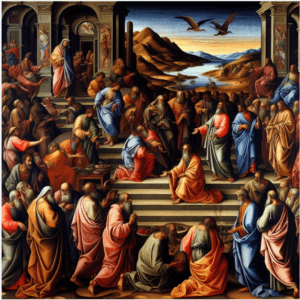 The money, amounting to about $1,000, was paid in presence of the assembled witnesses; and it was weighed.
The money, amounting to about $1,000, was paid in presence of the assembled witnesses; and it was weighed.
The practice of weighing money, which is often in lumps or rings, each stamped with their weight, is still common in many parts of the East; and every merchant at the gates or the bazaar has his scales at his girdle.
Abraham’s negotiation with Ephron the Hittite for the purchase of his cave and field at Machpelah has concluded. Negotiation may not be quite the right word, however.
Abraham immediately accepts the first price Ephron mentions, agreeing to purchase the field along with the cave he initially asked about.
For Abraham, the most important thing was to have the full legal ownership rights to this property, something he ensured by purchasing the cave and field in full view of the “people of the land” (Genesis 23:12).
There could be no legitimate dispute as to who owned this property.
Why was this so important?
In this era, people were often buried in their homeland, entombed along with their ancestors. Abraham’s decision to bury Sarah, and later to be buried himself, in Canaan, was a declaration of faith that this would become the permanent homeland of his offspring.
This is somewhat unusual, also, in that the land Abraham has just purchased is part of what God has promised to his descendants.
Genesis 23:17 KJV
And the field of Ephron, which was in Machpelah, which was before Mamre, the field, and the cave which was therein, and all the trees that were in the field, that were in all the borders round about, were made sure
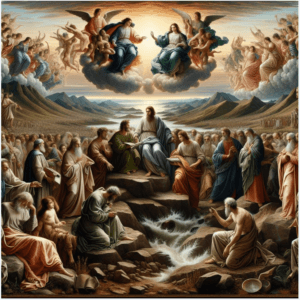 Abraham had to purchase not only the field and the cave, but also the trees. This meant that he was responsible for the maintenance of these trees as well. All was done in the formal, legal manner of the time.
Abraham had to purchase not only the field and the cave, but also the trees. This meant that he was responsible for the maintenance of these trees as well. All was done in the formal, legal manner of the time.
The record is fascinating to read, but also noteworthy for this: the only land Abraham ever really possessed was a burial spot for his wife. Abraham has just concluded negotiations with the Hittites to purchase a permanent burial site.
This will be the resting place for Sarah’s body (Genesis 23:1–2), as well as the future members of Abraham’s family. Specifically, Abraham has purchased a plot of land from Ephron the Hittite, a parcel which contains the cave Abraham wants to use as the family tomb.
Both parties have accepted the deal, and Abraham has immediately paid the asking price of 400 shekels of silver. The deal between Abraham and Ephron is now made official. This verse lists the details of the transaction.
The property in Machpelah, east of Mamre, is “made over” to Abraham. The purchase includes the cave, the field, and all the trees within the boundaries of the field. The following verse completes the details of the transaction.
Genesis 23:18 KJV
Unto Abraham for a possession in the presence of the children of Heth, before all that went in at the gate of his city.
 Ephron honestly and fairly makes a good title to the land. As that which is bought, must be honestly paid for, so that which is sold, must be honestly delivered and secured. Let us manage our concerns with punctuality and exactness, in order to avoid contention.
Ephron honestly and fairly makes a good title to the land. As that which is bought, must be honestly paid for, so that which is sold, must be honestly delivered and secured. Let us manage our concerns with punctuality and exactness, in order to avoid contention.
The previous verse detailed the property Abraham has purchased from Ephron the Hittite. It is located in Machpelah, east of Mamre. It includes a cave, a field, and all the trees within the boundary of that field.
Abraham has purchased this plot in order to make it his family tomb. Sarah has recently passed away (Genesis 23:2), and Abraham intends to bury her there. This act of burial has particular significance in that time period.
Choosing to bury one’s dead in a specific place was a sign of both residency and ownership. Even though he has to buy it, Abraham is able to take possession, within his lifetime, of a small portion of the Promised Land.
All of this small parcel is now “made over” to Abraham as his possession. The transaction is concluded in full view of the Hittites and all who go in at the gate of the city. These are likely the elders of Hebron.
This is a public and legal transaction according the customs of the land at this time.
Genesis 23:19 KJV
And after this, Abraham buried Sarah his wife in the cave of the field of Machpelah before Mamre: the same is Hebron in the land of Canaan.
 Thus he got possession of Machpelah and deposited the remains of his lamented partner in a family vault which was the only spot of ground he owned.
Thus he got possession of Machpelah and deposited the remains of his lamented partner in a family vault which was the only spot of ground he owned.
With the official period for mourning for his wife completed (Genesis 23:1–2) and a permanent burial place secured (Genesis 23:13–16), Abraham finally buries Sarah in the “cave of the field of Machpelah east of Mamre.”
More importantly, Abraham buried Sarah in the “land of Canaan.” In a sense, this choice to bury Sarah in Canaan was a final renouncement of his former homeland.
Until Sarah died and was buried in the land of promise, it was always potentially possible for Abraham to give up on God’s promises and “go home.”
He never did, and his decisive action to buy a burial place for Sarah and himself and their descendants in Canaan showed that he had fully cut his ties to his old life. Canaan, the land of promise, was home for now and for his people forever.
Genesis 23:20 KJV
And the field, and the cave that is therein, were made sure unto Abraham for a possession of a buryingplace by the sons of Heth.
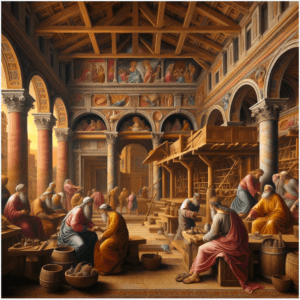 This is an important summary because finally, after years of nomadic wandering, Abraham owned a small piece of real estate in the midst of all the land divinely promised to him and his descendants.
This is an important summary because finally, after years of nomadic wandering, Abraham owned a small piece of real estate in the midst of all the land divinely promised to him and his descendants.
The cave also became, many years later, the family burial plot for Abraham, Isaac, Rebekah, Leah, and Jacob, with Rachel being the exception. This verse restates one more time the final legal result of Abraham’s deal with Ephron.
The Hittites signed off on the transaction. The field and cave were fully “made over” to Abraham for a burying place. They were his property.
Abraham’s purpose in buying this land was to establish a family tomb, for himself and his descendants, in the Promised Land which God had given them.
Not only was Sarah buried in this cave, Abraham, their son Isaac, his wife Rebekah, their son Jacob, and his wife Leah, would be buried here, as well. With this burial cave and field, the people of God had begun their occupation of the promised land of Canaan.
I hope that you have really enjoyed this post,
Please Leave All Comments in the Comment Box Below ↓

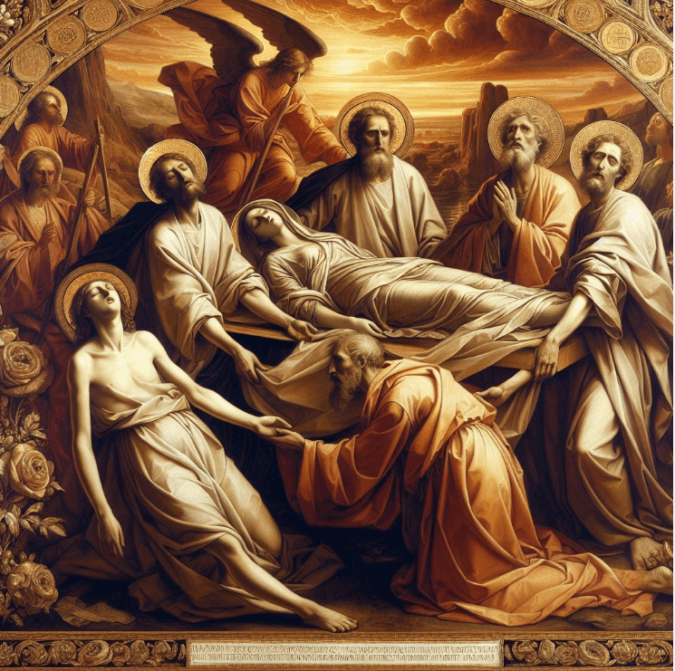











Hello Jerry, I just wanted to pass by and let you know that I had a nice read here.
I am not particularly religious, but I really enjoyed this information on Sarah’s death and burial. It was very interesting and gave me a new perspective on the importance of this event in the Bible. The last time I read over this material was when I was in school, many years ago.
I liked how you explained the cultural and spiritual context.
I wanted to ask you though, how do you think the themes from Sarah’s story can be adapted into modern life, especially for those of us who aren’t very religious?
Thanks and I will come back again!
Chris
Hello Chris,
I’m thankful that you had a nice read on The Death And Burial Of Sarah – A Grave Deal.
A number of us know nothing about religion when we first come to Christ. However, I think our own personal relationship with GOD, through Jesus Christ, reveals Revelation to us.
And the most comforting of the lessons from the life of Sarah in the Bible is the fact that God was gracious to Sarah and kept His promises to her, so, God will be just as gracious to you and I and fulfill His promises to us as well!
Hopefully, this will inspire your Spiritual advancement.
Blessings My Friend!
It’s amazing how Sarah’s death raises so many questions.
I’ve always read this in the Bible as a source of grief for Abraham. Of course, they had highs and lows like in any marriage. But she was his true soulmate. And also his half-sister!
But the way he wants a special place to bury her and his offspring certainly means that she meant the world to him.
Hello angelce903,
It is great reading another comment from you. It most certain pleases me to learn that you are learning some thing from each post. Thank you so much for your continued support.
Blessings My Friend!
Hi!
Every time I read this historical account, I am amazed at the negotiation customs in ancient times. The back and forth is intriguing.
This detailed account of Abraham’s negotiation to acquire the cave of Machpelah for Sarah’s burial beautifully illustrates both his deep respect for his wife and his strategic foresight in securing a permanent family burial place in Canaan. The narrative not only highlights the cultural norms and customs of the time but also underscores Abraham’s faith and determination in fulfilling God’s promises.
How did Abraham’s negotiation for the cave of Machpelah with Ephron demonstrate his belief in the future ownership of the land of Canaan by his descendants?
– Scott
Hello Scott,
The acceptance of a gift (rather than engaging in a legal purchase) establishes a situation of obligation and future reciprocity, and Abraham does not want to become entangled with the autochthonous inhabitants of the land in that way.
In this view, Abraham serves as a model of correct behavior for his descendants in the Persian period, who also should maintain their separation from the non-Israelite inhabitants surrounding them. While the tomb in the machpelah is reserved for the Israelites exclusively, the story, which tells how the natives allowed Abraham to purchase land among them, is supposed to model how the Israelites, after they become the guardians of the land, should allow non-Israelites to gain rights to the land and live among them.
In this view, the text carries the message that natives and strangers can live together, harmoniously, without destroying the integrity of the cult of YHWH.
Thanks for stopping by again,
Blessings My Friend!
Your post about the death and burial of Sarah brought out some details I hadn’t noticed before.
The fact that Abraham was accepted by the Hittites and that they offered him the ability to bury Sarah in their part of Canaan is one of them. This passage of the Bible portrays Abraham as a model of ethical behavior, both in personal matters (honoring his wife) and in business dealings. It emphasizes his respect for local customs, clear communication, and keeping to agreed terms.
I learned more about Abraham’s maturity with his integrity in his later life. His character matured from when he was younger and denied that Sarah was his wife out of fear.
Hello Delois,
Thanks for stopping by and commenting on this portion of Holy Bible Study.
Abraham’s journey, according to the Holy Bible, provides a profound narrative of spiritual and moral growth, particularly in terms of his integrity and maturity. Here are some key aspects of Abraham’s later life that highlight his development in these areas:
1. **Faithfulness and Trust in God**: Abraham’s faith journey began with God’s call to leave his homeland and go to a place that God would show him (Genesis 12:1-4). Despite facing uncertainty and challenges, Abraham demonstrated remarkable trust in God’s promises. This trust deepened over the years, especially as he waited for the fulfillment of God’s promise of a son through Sarah, despite their old age (Genesis 15:1-6, 17:15-21).
2. **Hospitality and Generosity**: Abraham exemplified hospitality and generosity when he welcomed three strangers near Mamre, not knowing they were angels. He offered them food, water, and rest, showing his integrity in caring for others (Genesis 18:1-8).
3. **Humility and Intercession**: In Genesis 18, when God revealed his plan to destroy Sodom and Gomorrah due to their wickedness, Abraham interceded for the cities out of concern for his nephew Lot and any righteous people living there. His humility and concern for others were evident in his plea for God to spare the cities if righteous people could be found (Genesis 18:22-33).
4. **Obedience and Sacrificial Faith**: Perhaps the ultimate test of Abraham’s integrity and faith came in Genesis 22, when God asked him to sacrifice his beloved son Isaac as a test of obedience. Abraham’s willingness to obey God, even in the face of such a difficult command, demonstrated his profound maturity and trust in God’s ultimate plan (Genesis 22:1-18).
5. **Covenant and Blessings**: Throughout his life, God reaffirmed his covenant promises to Abraham, assuring him of blessings and descendants who would become a great nation. Abraham’s faithfulness to God’s covenant and his continued trust in God’s promises highlight his integrity and maturity as a man of God (Genesis 12:2-3, 15:1-6, 17:1-8).
In summary, Abraham’s journey in the Bible illustrates his growth in integrity, maturity, and faithfulness to God over the course of his life. His willingness to follow God’s leading, his generosity and hospitality, his humility in interceding for others, his obedience even in difficult circumstances, and his steadfast trust in God’s promises all contribute to his portrayal as a significant figure of faith and integrity in the Holy Scriptures.
Hopefully, this adds to your vault of knowledge concerning Abraham.
Blessings My Friend!
I’m particularly interested in to see how Abraham’s journey of faith and his status as a pilgrim influenced his lack of a permanent family burying-place.
This detail emphasizes his transient lifestyle and deep reliance on faith. The process of securing a burial site for Sarah highlights the importance of establishing a permanent resting place within the land of Canaan, reinforcing his long-term commitment to the land promised to him by God.
Abraham’s careful approach to legally acquiring the cave from the Hittites underscores his desire for clear and undisputed ownership, ensuring a lasting legacy for his descendants in Canaan.
Hello Elica,
Your insight into Abraham’s journey and his status as a pilgrim adds a compelling layer to understanding his legacy. Indeed, his transient lifestyle highlights his profound faith and reliance on God’s promises.
The meticulous effort to secure a burial site for Sarah not only underscores the significance of a permanent resting place but also emphasizes his commitment to the land of Canaan. It’s fascinating how this careful acquisition of the cave from the Hittites reflects his desire for a lasting and undisputed inheritance for his descendants.
Your analysis brings out the intricate relationship between faith, land, and legacy in Abraham’s story.
Thanks for stopping by,
Blessings My Friend!